Class 7 Maths Chapter 2 – Fractions and Decimals Exercise 2.3
1. Find:
(i) ¼ of (a) ¼ (b) 3/5 (c) 4/3
Solution:-
(a) ¼
We have,
= ¼ × ¼
By the rule Multiplication of fraction,
Product of fraction = (product of numerator)/ (product of denominator)
Then,
= ¼ × ¼
= (1 × 1)/ (4 × 4)
= (1/16)
(b) 3/5
We have,
= ¼ × (3/5)
By the rule Multiplication of fraction,
Product of fraction = (product of numerator)/ (product of denominator)
Then,
= ¼ × (3/5)
= (1 × 3)/ (4 × 5)
= (3/20)
(c) (4/3)
We have,
= ¼ × (4/3)
By the rule Multiplication of fraction,
Product of fraction = (product of numerator)/ (product of denominator)
Then,
= ¼ × (4/3)
= (1 × 4)/ (4 × 3)
= (4/12)
= 1/3
(ii) 1/7 of (a) 2/9 (b) 6/5 (c) 3/10
Solution:-
(a) 2/9
We have,
= (1/7) × (2/9)
By the rule Multiplication of fraction,
Product of fraction = (product of numerator)/ (product of denominator)
Then,
= (1/7) × (2/9)
= (1 × 2)/ (7 × 9)
= (2/63)
(b) 6/5
We have,
= (1/7) × (6/5)
By the rule Multiplication of fraction,
Product of fraction = (product of numerator)/ (product of denominator)
Then,
= (1/7) × (6/5)
= (1 × 6)/ (7 × 5)
= (6/35)
(c) 3/10
We have,
= (1/7) × (3/10)
By the rule Multiplication of fraction,
Product of fraction = (product of numerator)/ (product of denominator)
Then,
= (1/7) × (3/10)
= (1 × 3)/ (7 × 10)
= (3/70)
2. Multiply and reduce to lowest form (if possible):
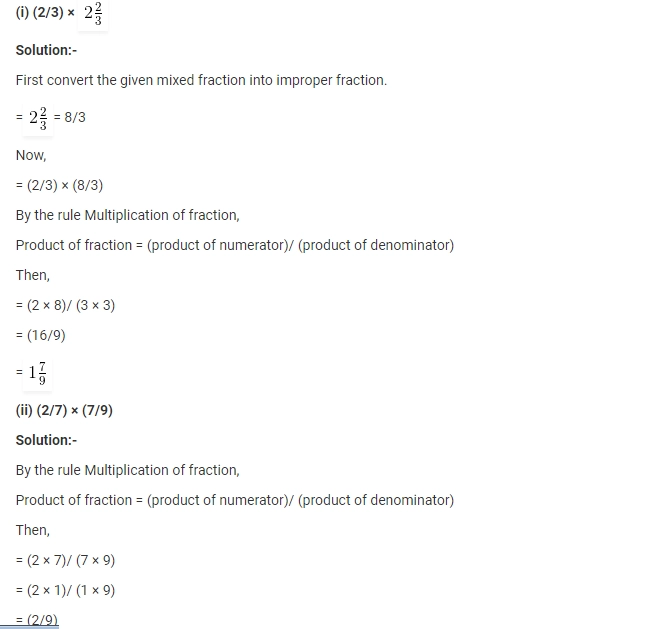
(iii) (3/8) × (6/4)
Solution:-
By the rule Multiplication of fraction,
Product of fraction = (product of numerator)/ (product of denominator)
Then,
= (3 × 6)/ (8 × 4)
= (3 × 3)/ (4 × 4)
= (9/16)
(iv) (9/5) × (3/5)
Solution:-
By the rule Multiplication of fraction,
Product of fraction = (product of numerator)/ (product of denominator)
Then,
= (9 × 3)/ (5 × 5)
= (27/25)
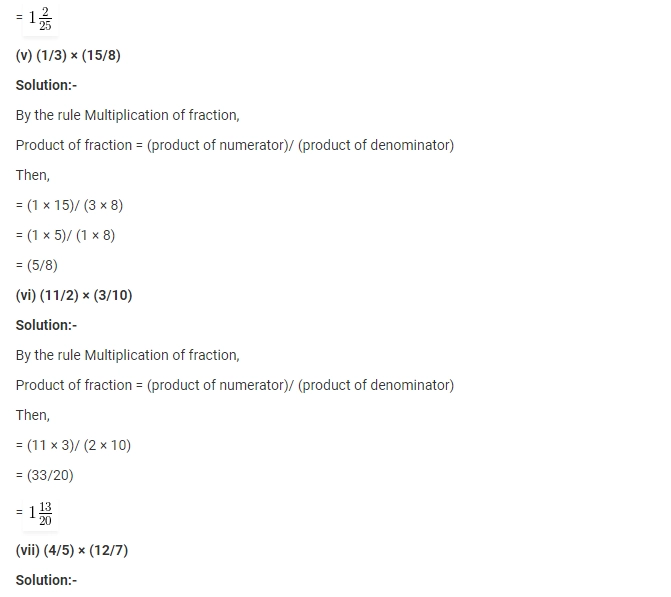

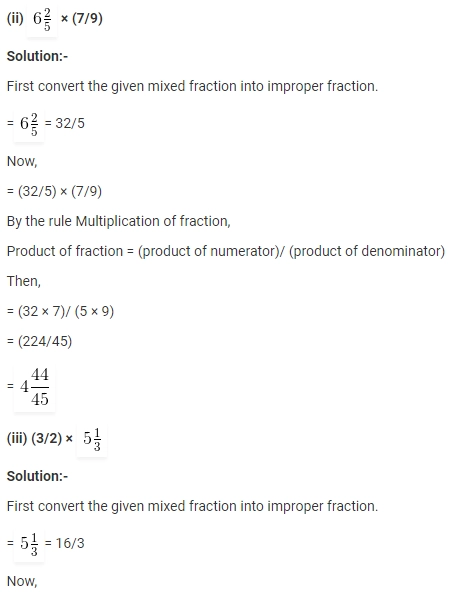
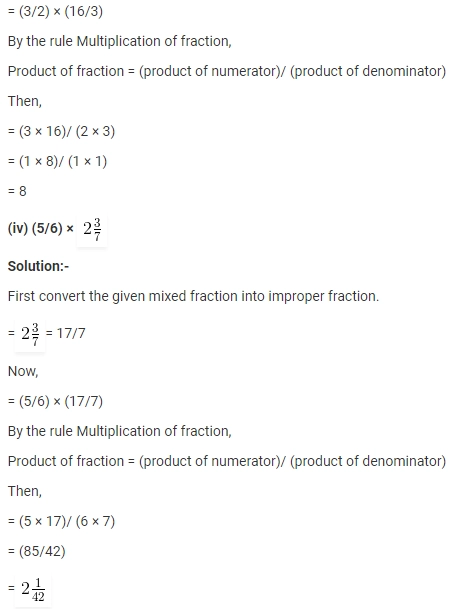


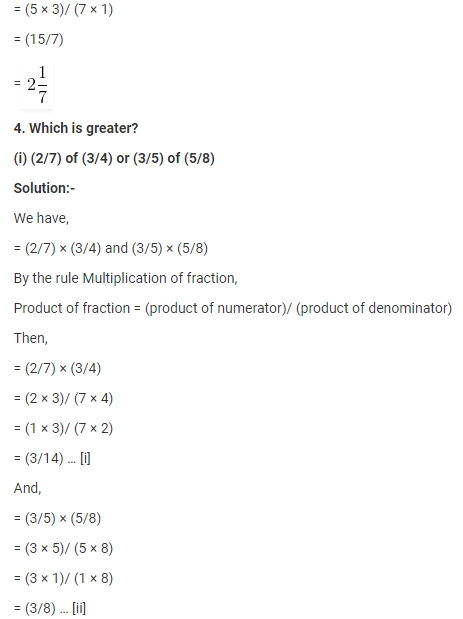
Now, convert [i] and [ii] into like fractions,
LCM of 14 and 8 is 56
Now, let us change each of the given fraction into an equivalent fraction having 56 as the denominator.
[(3/14) × (4/4)] = (12/56)
[(3/8) × (7/7)] = (21/56)
Clearly,
(12/56) < (21/56)
Hence,
(3/14) < (3/8)
(ii) (1/2) of (6/7) or (2/3) of (3/7)
Solution:-
We have,
= (1/2) × (6/7) and (2/3) × (3/7)
By the rule Multiplication of fraction,
Product of fraction = (product of numerator)/ (product of denominator)
Then,
= (1/2) × (6/7)
= (1 × 6)/ (2 × 7)
= (1 × 3)/ (1 × 7)
= (3/7) … [i]
And,
= (2/3) × (3/7)
= (2 × 3)/ (3 × 7)
= (2 × 1)/ (1 × 7)
= (2/7) … [ii]
By comparing [i] and [ii],
Clearly,
(3/7) > (2/7)
5. Saili plants 4 saplings, in a row, in her garden. The distance between two adjacent saplings is ¾ m. Find the distance between the first and the last sapling.
Solution:-
From the question, it is given that,
The distance between two adjacent saplings = ¾ m
Number of saplings planted by Saili in a row = 4
Then, number of gap in saplings = ¾ × 4
= 3
∴The distance between the first and the last saplings = 3 × ¾
= (9/4) m
= 2 ¼ m
Hence, the distance between the first and the last saplings is 2 ¼ m.
6. Lipika reads a book for 1 ¾ hours every day. She reads the entire book in 6 days. How many hours in all were required by her to read the book?
Solution:-
From the question, it is given that,
Lipika reads the book for = 1 ¾ hours every day = 7/4 hours
Number of days she took to read the entire book = 6 days
∴Total number of hours required by her to complete the book = (7/4) × 6
= (7/2) × 3
= 21/2
= 10 ½ hours
Hence, the total number of hours required by her to complete the book is 10 ½ hours.
7. A car runs 16 km using 1 litre of petrol. How much distance will it cover using 2 ¾ litres of petrol.
Solution:-
From the question, it is given that,
The total number of distance travelled by a car in 1 liter of petrol = 16 km
Then,
Total quantity of petrol = 2 ¾ liter = 11/4 liters
Total number of distance travelled by car in 11/4 liters of petrol = (11/4) × 16
= 11 × 4
= 44 km
∴Total number of distance travelled by car in 11/4 liters of petrol is 44 km.
8. (a) (i) provide the number in the box [ ], such that (2/3) × [ ] = (10/30)
Solution:-
Let the required number be x,
Then,
= (2/3) × (x) = (10/30)
By cross multiplication,
= x = (10/30) × (3/2)
= x = (10 × 3) / (30 × 2)
= x = (5 × 1) / (10 × 1)
= x = 5/10
∴The required number in the box is (5/20)
(ii) The simplest form of the number obtained in [ ] is
Solution:-
The number in the box is 5/10
Then,
The simplest form of 5/10 is ½
(b) (i) provide the number in the box [ ], such that (3/5) × [ ] = (24/75)
Solution:-
Let the required number be x,
Then,
= (3/5) × (x) = (24/75)
By cross multiplication,
= x = (24/75) × (5/3)
= x = (24 × 5) / (75 × 3)
= x = (8 × 1) / (15 × 1)
= x = 8/15
∴The required number in the box is (8/15)
(ii) The simplest form of the number obtained in [ ] is
Solution:-
The number in the box is 8/15
Then,
The simplest form of 8/15 is 8/15